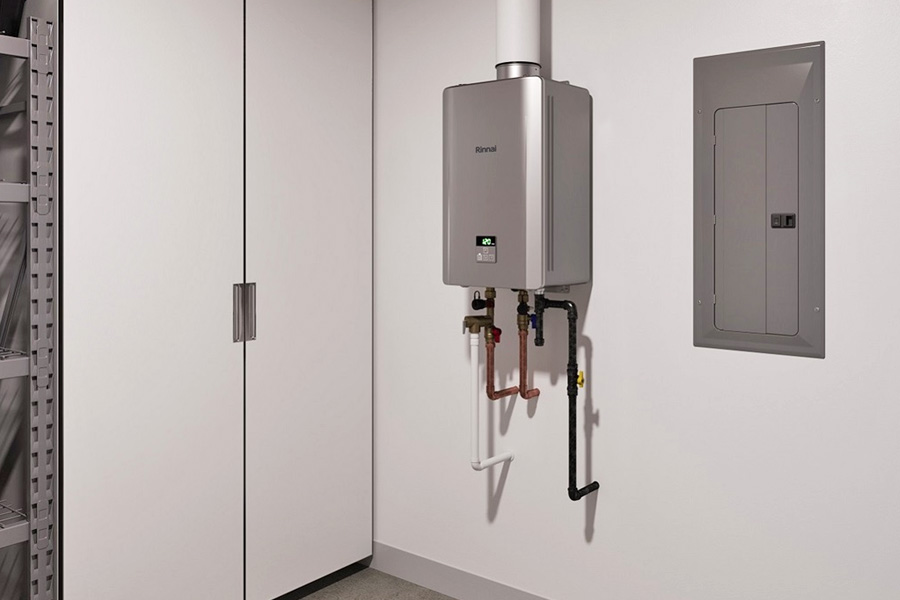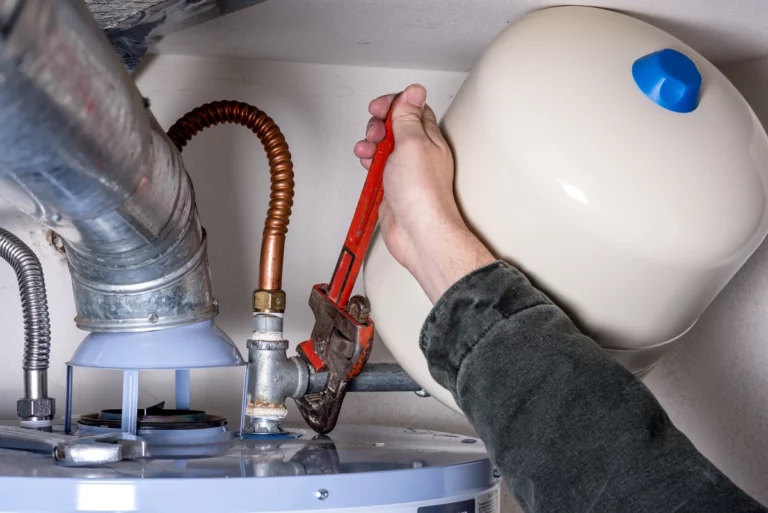Hot showers are a basic necessity in every household, and choosing the right water heater can make all the difference. With with so many options available, it can be tough to pick between tank and tankless water heaters.
But, don’t worry – we’ve got you covered.
In this post, we dive into the world of these two types of water heaters, understand how they work, compare them based on various factors like cost and energy savings, and highlight their pros and cons.
So whether you’re building a new home or just looking to upgrade your current system, keep reading to find out which is better – tank or tankless!
Understanding Tank and Tankless Water Heaters
If you’re looking to upgrade your water heater, it’s essential to understand the differences between tank and tankless water heaters.
Tank water heaters are the traditional option that store and heat a large volume of water in a storage tank. On the other hand, tankless water heaters provide hot water on-demand, eliminating the need for a storage tank. While tank water heaters can supply a continuous flow of hot water, tankless heaters offer energy efficiency and space-saving benefits.
What is a Tank Water Heater?
A tank water heater, also known as a storage water heater, is a traditional system that stores and heats a large amount of water in a tank. It operates by constantly heating the water inside the tank to maintain a set temperature. When hot water is needed, it is dispensed from the tank through the plumbing system.
What is a Tankless Water Heater?
A tankless water heater, also known as an on-demand water heater, is a system that heats water as it flows through the unit. Unlike traditional tank water heaters, which store and continuously heat a large volume of water, tankless models only heat the water when it is needed. This results in energy savings and a continuous supply of hot water.
How Do These Water Heaters Work?
How do tankless and tank water heaters work? Understanding the working principles of these water heaters is essential in determining which one is better for your needs. Let’s explore how each type functions to provide hot water on demand or store it in a tank for later use.
1. Tank Water Heaters
Ever wondered how a tank water heater works? Well, let’s dive into the fascinating world of tank water heaters. These marvelous appliances use a simple but effective working principle to provide you with hot water whenever you need it. Inside the tank, water is heated by gas-powered or electric heating elements. As the cold water enters the tank, it’s heated up and stored until you turn on the faucet or start using hot water appliances like the dishwasher or washing machine. Tank water heaters are known for their reliability and ability to supply a large volume of hot water. So, next time you enjoy a warm shower or do your laundry, remember the impressive working principle of your trusty tank water heater!
2. Tankless Water Heaters
Let’s dive into the fascinating world of tankless water heaters and explore how they work their magic. Unlike traditional tank water heaters that store and heat a fixed amount of water, tankless models are on-demand hot water powerhouses. They use a heat exchanger to instantly heat cold water as it flows through the unit, providing a continuous supply of hot water whenever you need it. Whether you’re washing dishes, running a load of laundry, or taking a blissful shower, a tankless water heater ensures a steady stream of hot water without the need for a storage tank. Say goodbye to cold showers and hello to endless hot water!
Comparing Tank vs Tankless Water Heaters
When it comes to comparing tank and tankless water heaters, there are a few key factors to consider. Tank water heaters store a certain amount of hot water in a storage tank, typically ranging from 30 to 80 gallons. On the other hand, tankless water heaters provide hot water on demand, heating the water as it flows through the unit. One of the main cons of tank water heaters is standby heat loss, which occurs when heat dissipates from the stored water. Tankless water heaters, on the other hand, are more energy efficient since they only heat the water when it’s needed. This can lead to significant cost savings on energy bills for homeowners. Additionally, tankless water heaters have a longer lifespan compared to tank models, with many lasting over 20 years. However, it’s important to note that tankless models may have higher upfront costs and may require a higher flow rate for multiple fixtures to receive hot water simultaneously.
Initial Cost
Let’s dive into the cost aspect of tankless vs tank water heaters! When it comes to initial cost, tank water heaters are generally more affordable upfront compared to tankless models. However, it’s important to consider the long-term financial implications. Tankless water heaters may have a higher initial cost, but they can help you save on energy bills due to their energy efficiency. Additionally, tankless heaters tend to have a longer lifespan than traditional tank water heaters, which means fewer replacements and potentially more cost savings in the long run. Keep these factors in mind when making your decision!
Operating Costs & Energy Savings
Let’s dive into the cost and energy savings aspect of tankless vs tank water heaters. When it comes to operating costs, tankless water heaters have the upper hand. They only heat water on demand, which means they don’t waste energy keeping a large volume of water hot at all times. This can lead to significant savings on your energy bills over time. Additionally, tankless heaters have a longer lifespan compared to tank water heaters, so you’ll save on replacement costs in the long run. So, if you’re looking for lower energy bills and a longer-lasting water heater, a tankless model might be the right choice for you.
Equipment Life & Installation
Let’s dive into the comparison based on equipment life and installation between tankless and tank water heaters. When it comes to equipment life, tankless water heaters tend to have a longer lifespan compared to their tank counterparts. Tankless models can last up to 20 years, while tank water heaters typically have a lifespan of about 10-15 years. Installation is another factor to consider. Tankless water heaters require professional installation due to their complex nature, while tank water heaters are relatively easier to install. It’s important to weigh the pros and cons of each type and make an informed decision that suits your needs.
Advantages & Disadvantages
Let’s start with the advantages of tank water heaters. They have a lower initial cost compared to tankless heaters and are capable of supplying large amounts of hot water to multiple fixtures simultaneously. On the other hand, tankless water heaters offer energy efficiency and cost savings in the long run due to their on-demand heating system. However, they can be more expensive to purchase and install initially. Both systems have their drawbacks, such as the standby heat loss in tank heaters and the potential for lower flow rates in tankless units. It’s essential for homeowners to consider their specific needs and preferences to make an informed decision.
Tank Water Heaters
Tank water heaters offer several advantages that make them a popular choice for many homeowners. First and foremost, tank water heaters have larger storage tanks, allowing them to store and heat larger quantities of water. This is especially beneficial for households that require a high volume of hot water, such as those with multiple bathrooms or large families. Additionally, tank water heaters are generally more affordable to purchase and install compared to tankless water heaters. They also tend to have a longer lifespan, making them a cost-effective option in the long run. With their ability to provide a continuous supply of hot water, tank water heaters are a reliable choice for meeting the hot water demands of any household.
Tankless Water Heaters
Tankless water heaters offer numerous advantages over traditional tank water heaters. One of the biggest advantages is energy efficiency. Tankless models only heat water when it’s needed, which can result in significant savings on energy bills. Additionally, tankless heaters take up less space since they don’t require a large storage tank. They also have a longer lifespan compared to tank water heaters. Another advantage is that tankless heaters provide hot water on-demand, so homeowners never have to worry about running out. Overall, tankless water heaters are a great option for those looking for energy efficiency, cost savings, and continuous hot water.
Disadvantages of Both Systems
Let’s face it, no system is perfect, not even when it comes to water heaters. Both tank and tankless systems have their drawbacks.
With tank water heaters, one of the cons is the standby heat loss. Because the water is constantly being heated and stored in a tank, there is some heat loss over time, leading to energy inefficiency. Additionally, tank water heaters take up quite a bit of space and may not be suitable for smaller homes.
On the other hand, tankless water heaters have their own set of cons. For example, they have a limited flow rate, which means that if you have multiple appliances running simultaneously, you may experience a decrease in hot water supply. Another drawback is the initial cost, as tankless units tend to be more expensive to purchase and install compared to tank water heaters.
So before making a decision, it’s important to weigh these disadvantages against the advantages and choose the system that best fits your needs.
Tankless vs Tank Water Heater – Which is Better?
So, which is better – a tank or tankless water heater? Well, it ultimately depends on your specific needs and preferences.
Tank water heaters are more affordable upfront, while tankless water heaters offer energy savings in the long run. Tank water heaters provide a continuous supply of hot water, while tankless water heaters are more space-saving and efficient. Both options have their pros and cons.
In conclusion, when choosing between a tank and tankless water heater, consider factors such as initial cost, operating costs, energy savings, equipment life, installation, and hot water usage. Assess your needs and budget to make an informed decision. If you’re looking for a budget-friendly option with continuous hot water supply, a tank water heater might be the right choice. However, if you prioritize energy efficiency and space-saving, a tankless water heater could be the better option for you.
Talk To The Water Heater Experts
We understand that investing in a water heater is an important decision, and we want to ensure that you are fully informed and confident in your choice. So pick up the phone and let our plumbing experts guide you through the process of finding the perfect water heater for your needs.





